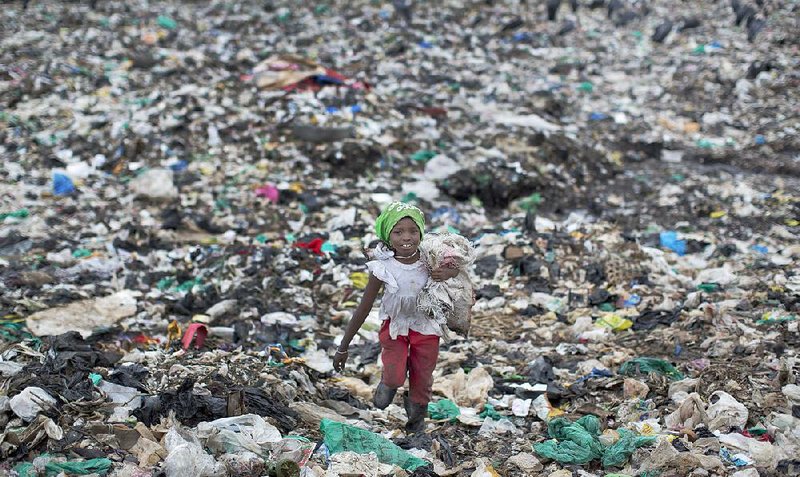NAIROBI, Kenya -- Using hooks or their bare hands, men, women and children traipse through the sludge that pools around the mountains of garbage.
They hunt for bottles, plastic bags and anything else that can be recycled to earn themselves enough for their daily bread.
The scavengers at Nairobi's Dandora dump are some of the poorest of Kenya's poor -- and they are likely to be on Pope Francis' mind when he makes his first trip to Africa on Thursday to express his message of environmental stewardship and care for society's most marginalized.
One of Francis' most anticipated speeches will be to the Nairobi-based United Nations Environment Program, which has warned that those working and living near the Dandora dump suffer from a variety of diseases including lung cancer, skin diseases and lead poisoning, which causes stunted growth and mental disabilities in children.
Francis has denounced how the poor suffer disproportionately from environmental degradation, especially the health effects of pollution, and at U.N. Environmental Program meetings he is likely to call for governments to clean up their acts ahead of climate negotiations opening in Paris next week.
He warned in his encyclical "Praise Be" that the dumping of toxic, radioactive and industrial waste risks turning Earth into "an immense pile of filth."
About 3,000 Kenyans must try to avoid used intravenous needles, diapers, surgical knives and other hazards as they pick through the 2,000 tons of garbage dumped there daily. They work alongside hundreds of Marabou storks that scavenge for carrion and scraps of food amid the stench.
They are reluctant to accept that their bodies might be withering as a result of the waste, fearing that such an admission will persuade the county government to shut down the dump -- and their livelihoods.
"I used to have nothing," said Mary Nyambura, a 47-year-old widowed mother of seven. She said the dump is her only means of survival. "But if I come here, I am assured of at least $1 that can feed my family."
An area legislator, James Gakuya, initiated a lawsuit against the county government in 2014 seeking to close the dump, arguing that it was damaging the health of his other constituents in nearby residential areas.
There was a proposal to relocate the site to the outskirts of the city. But the Kenya Airports Authority said the proposed locale was on a flight path for planes taking off and landing and that the Marabous that circle overhead would endanger aircraft. The proposal was rejected.
Faulu Nyokagi Mbugua, a 36-year-old businessman and single mother of two, said her health has deteriorated in the past two years as the dump inched closer to her home.
"I have breathing problems, I cannot eat," she said, wheezing.
But the Waste Pickers Association said the health concerns are overblown.
"Those people who become sick don't eat a balanced diet, smoke too much, or have other conditions such as AIDS," said Samuel Goko, the association chairman. "Even pregnant women come and work here, and most of the babies are born without defects."
The pope knows well the plight of garbage pickers, having ministered for years to the "cartoneros" of Buenos Aires, who also pick through garbage looking for recyclable goods. Last month, he baptized the son of the leader of the "cartoneros" in a small ceremony inside the Vatican. The child was named after the pope.
Nyambura, the mother of seven, said she suffers from respiratory illnesses and skin diseases. But, she said, scavenging at the dump -- from which she outfitted her one-room house with the mattresses her children sleep on -- is better than being on the streets.
On a recent day at the dump, Nyambura was accompanied by her youngest daughter, Joyce Njeri, 8. She works at the dumpsite during school vacations, and she has the sores and scratches on her feet to prove it. She said she doesn't like the work, for which she earns 50 cents a day, split with her mother.
Nyambura said she has no choice but to put her children to work to make ends meet.
"It's better to scratch and cough and have something to eat. Now if they close, where will we go?" she asked.
Information for this article was contributed by Nicole Winfield of The Associated Press.
A Section on 11/25/2015
